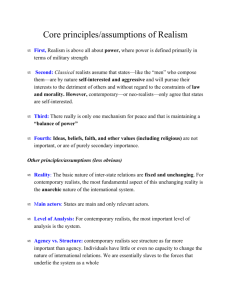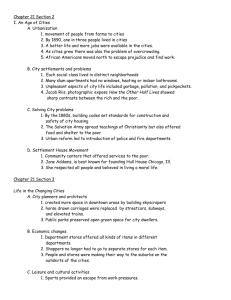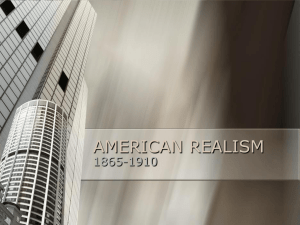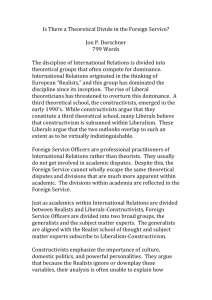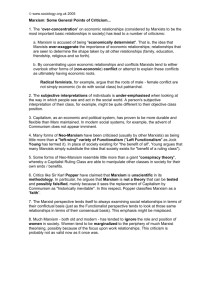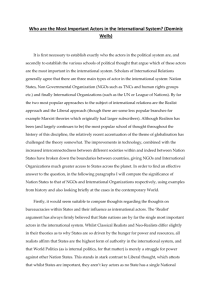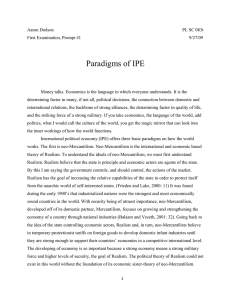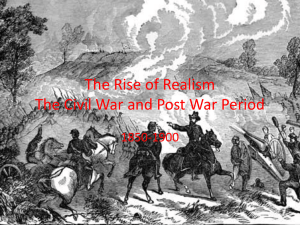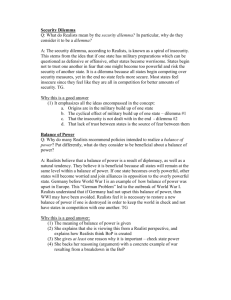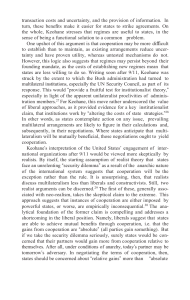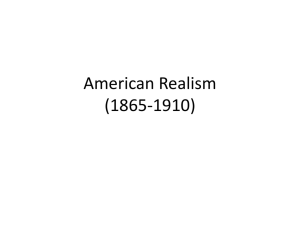Think about
advertisement
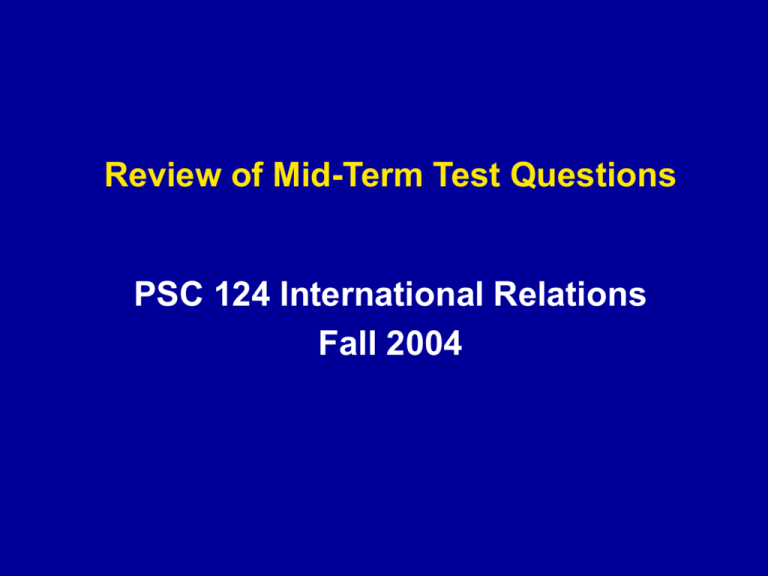
Review of Mid-Term Test Questions PSC 124 International Relations Fall 2004 Let’s talk about the upcoming exam. No anxiety allowed! Our suggestions are: • Devote a sentence or two to stating what you believe the question asks for. Don't merely quote the question: the reader knows what it is . This is important for you to think about as you prepare: you want to be responsive to the question and not throw irrelevant information at it. • Giving real life examples are useful. The reader (grader) is better able to determine if you understand what you are talking about. You always earn marks for examples! • Does the question employ, and will you use, "technical" terms in your answer? That is, terms which have special meanings within the field of IR. Some are: state, balance of power, democratic peace etc. • If so, be sure to define these at least briefly. (Some questions just ask for definitions and/or explanations of such terms, so you would have to do that.) • Once you've done that, the reader can probably follow the reasoning in your answer even if you make small mistakes in presenting that reasoning. (At a test, "reader" = "grader," so this technique helps earn partial credits.) • Some questions ask you to construct an argument to some conclusion (generally a conclusion of your choice). • The quality of your argument/reasons (including accuracy of historical information) is important. As usual, examples help. • How much "detail" must you provide? The glib answer is, “just enough to answer the question” (within the time constraint of roughly 27.5 minutes per answer). • If you are asked questions for which you are well prepared, the chances are that you will know enough to write focused answers which require time greater than the test allows. Be disciplined! Be sure to construct a basic answer; then, if you have time left, return to fill it out. You might intentionally leave blank space when writing in the blue books. • Don't write a "perfect" answer to one question at the expense of an adequate answer to the other. Ok, let’s take a look at some questions. • Q.1. What are the central claims of the family of theories called Political Realism? • a) What are humans like? • b) What are the units between/among which there are relations? Define the units. • c) What are the goals / objectives of those units? • d) How is stability/peace achieved? What is that ‘units’ practice or adhere to so that they remain intact/secure? • e) What is the organizing principle? In other words, what is the international system like? • f) The three ‘Ss’: S, S, S • Q.2. Explain these abstract concepts in the context of political Realism: (a) the state, (b) sovereignty, (c) self-help system, (d) anarchy. • Well, folks, I guess you will already have answered this when you answer the first question! Go to box 7.5 on page 158 in BS! • Q.3. Answer these questions from the perspective of political Realism: What was 'the German problem'? Since Germany reunified in 1990 is there a new 'German problem'? Why or why not? – a) Tell us the historical facts: When did the problem come about? How did it come about? Perhaps you may want to start with Box 3.3 on p.55 in BS. – b) Do tie this to the political Realist abstraction of balance of power. This will be part of your explanation as to how other units in the system perceived Germany. – c) How did victors of WWI address the ‘problem’? What were the specific steps they took? – d) What happened in 1939? (Germans did something, I guess). Do tie this to some other political Realist abstraction. What is it? States seek to… – e) How did WWII victors address the problem? (division, occupation… you know the story, right?) – f) The last part of the Q.: post cold-war Germany? Are there some aspects of unification that may provoke a re-initiation of the ‘German problem’? Or, is Germany fully locked into the new ‘security architecture’ of Europe, hence the resolution of the ‘problem’? • Q.4. Why did the Soviet Union disintegrate? [Be clear about the theoretical perspective that you choose to answer this question, and about the assumptions that you make.] – a) First, do visit the professor’s link labeled “class” for 13 September. – b) Next, go back to the Crockatt chapter in BS. – c) Hey Realists! You may want to re-visit p.157 in BS. – d) Liberals, I didn’t forget you: How about making an ‘end of history’ argument? Irresistible expansion of liberal democratic [i.e. Western] values, kind of thing. For that, you may want to brush up on your Fukuyama, thought. Go! – e) Oh, world-systemic Marxists, what do you have to say? How do you like ‘an ever-expanding capitalist world system crushed the failing Soviet system’? Expand on it, why not. Don’t forget your core, periphery, semi-periphery • Q.5. “Balance of Power” as an option for French Foreign Policy today. Identify some factors which support its usefulness and other factors which reject its usefulness. – Pick a working definition of balance of power: Try this, for example: “A state should shift alliances if need be to prevent another state (or group of states) from becoming too powerful, which would maintain the balance and prevent emergence of hegemons.” – Now, try to think in terms of France: What are some of the basic things you know about France? Is there a hegemon in the world today? (Remember to define hegemon as a Realist). Now France is a powerful European country, an EU member, a NATO member, holds a permanent seat in the UN…What would French foreign policy look like if the French were to ‘shift alliances rapidly’ to practice some balance of power? What would it want to? With whom? What, if at all, would France gain/lose in the short- and/or long-terms? • Q6: What is Collective Security? Strengths and Weaknesses – – – – – – BS 8, please. esp. p.167, on to 178, and p263/4 Who are the proponents of col. sec.? When did the idea first emerge and why? How is it exercised? (BS p263/4) What are its three main conditions? For the benefits explain its advantages over other forms of security arrangements – On weaknesses, describe on what grounds is it criticized by other families? – You can use examples to support your answers in each of the last two questions • Q7: What KR mean by “ghosts” (of Westphalia). Think about: – What is a ghost in general? – So how is this analogy used in relation to IR by KR? – Give examples of the ghosts from Westphalia • You need to cover both what was done, and what was left undone, and give examples of how this affects the practice of international relations today. • Do yourself a favor and read the intro to KR (pp.1-5) • Think about those ‘A’ words: Anarchy, Amorality. Ghost. Oops, the third one is not an A word. But you see why I put it there. Don’t you? • Q8. Why a Catholic kingdom joins Protestant entities against another Catholic Kingdom. – First identify which Catholic Kingdom joined the Protestants in the War – Then explain about the hegemony of the Holy Roman Empire – Give an overview (not a long story) about what led to the religious war – Then why this Catholic kingdom chose to side with non-Catholics. What did it hope to gain? Cardinal Richelieu, raison d’etat...do these ring some bells? Move on to p.71 in KR, and read on. – Why is this act considered significant in international relations; ie what were the long-term effects/results/ implications of this choice on the relations between these kingdoms thereafter? – ‘Ends justifies the means’. End: Increasing the power and prestige of that Catholic kingdom (which is it?) Means: your answer is in the question itself. • Q9: How to link the peace treaties to current international system? • In addition to other stuff, I’m sure you guys will read KR pp.221-226 • There are some insights in the half-page quote on p.147 in KR. p. 85 is useful, too. • Class notes for October 13 (esp. the latter half) should also help. • “Deficiencies” in the world today? Oh, I see that word in the title on p.192 in KR. Take a look, will you? • Q10: Do Realists have anything insightful to say about post-WWII European Integration? – BS 23 is the chapter to go. – First, describe regional integration. What is it? – Then, there are two perspectives on EU Integration. Which one applies to Realists? Go to boxes 23.6 and 23.7 on BS p.500. Think about: • Who makes the rules? • Who are the players? • Are there areas where integration has failed? How would Realists explain these? – With regard to the critical examination consider: • Are the claims made by Realists about EU integration valid? • How do their opponents (Liberals) counter these claims – As always, examples of the different perspectives on integration add you marks! • Q11: The Security Dilemma and its relevance to IR today – Describe what it means. BS 12 is the place to go. Esp. pp.257-8. – Explain the two major causes of the security dilemma; ie, what makes cooperation difficult in their view? – Is there a possibility of a way out of this dilemma? – If you can use examples in answering each of these answers, you should be able to demonstrate whether it has, or lacks, relevance today. • Q12: Explain how a dynamic balance of power can be achieved. What are its benefits? – First describe the balance of power (Remember? You already did this step when answering the 5th question) – Then explain how it can be achieved – Benefits – what are its strengths? (Always helps to think in terms of how useful it is compared to Liberalism and Marxism) • Q13: Marxist and Liberals “end of History”. – Remember that by now you’ve already answered Q.4 as a Liberal or as a Marxist. Haven’t you? Also recall the debate on the “triumph of liberalism”? – Describe the “end of History for Liberals” (Fukuyama in BS p127) – Describe the “end of history for Marxists” – Then summarize their differences and their similarities • Q14: What is the Democratic Peace Thesis? How can this be a Marxist interpretation? – First tell us what you understand to be the DP thesis. Maybe you’d start from p.171 and 262/3 in BS. • Ensure you capture the relationships between the different types of states, not just one type of states. – Then identify the essential(s) of Marxism that can be used to support this same thesis • NB: The answer to Q13 may offer some hints about how to link the thesis to Marxism. Who are the key proponents of the Democratic Peace thesis and what are the “things” that they advocate or offer to enhance cooperation between actors? How can Marxists appropriate these same arguments to propound the same thesis but as a Marxist thesis? • Q15: Globalization and Regional Integration. – Describe globalization (you want some definitions? Jump to KR p.157) and regional integration – Think about how the two approaches to the EU Integration process are similar or different from globalization (BS p498-500) – Using examples from other regions to support your answer may also help NB: remember globalization can be either a process or a state (condition). Again, tell us which you are discussing. Tips to help you understand the questions and offer correct responses/arguments: • What questions drive each theory: – What causes war, violence and peace (Realism) – What causes cooperation (Liberals) – What causes social change (Marxists) • The Key Actors emphasized by the each theory – States (Realists) – States, NGOs, MNCs and IGOs (Liberals) – Social Classes (Marxists) • Important terms/concepts – – Hegemony (Realists and Marxists) – State Intentions (Realists and Liberals) – Solutions to Anarchy (Realists and Liberals) • Self help and balance of power vs Institutions & collective security
